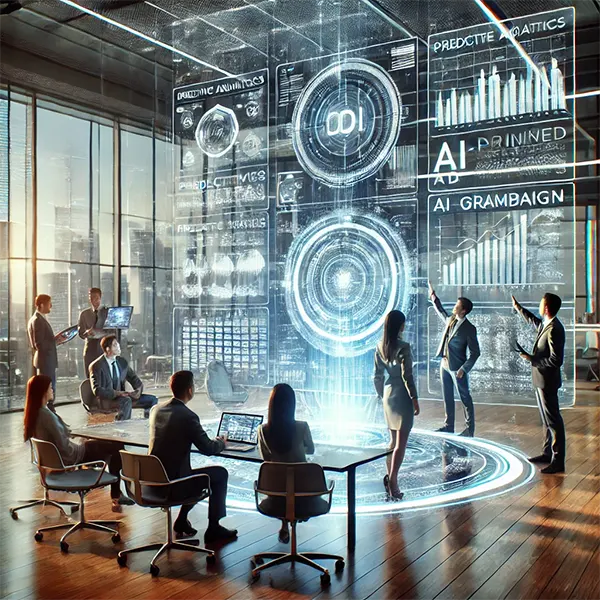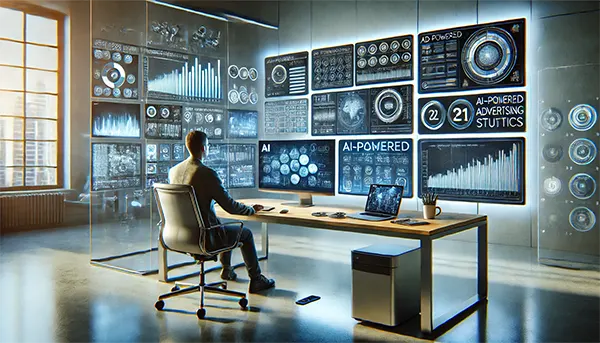How OpenAI and Google Are Transforming Advertising: Will Traditional Marketing Disappear?

The rise of artificial intelligence (AI) and automation is ushering in a new era in the advertising industry. OpenAI, Google, and other tech giants are integrating AI-driven tools into digital marketing, reshaping strategies that businesses have relied on for decades. This shift raises a crucial question: is traditional marketing becoming obsolete?
Is AI Replacing Marketers? Tasks That Are Already Automated
AI has already taken over numerous tasks that were once performed manually by marketing professionals. From automated content generation to AI-driven ad bidding, many aspects of digital advertising are now optimised using machine learning algorithms. Tools like ChatGPT, Google Bard, and Jasper AI can craft ad copy, social media posts, and even blog articles with remarkable speed and efficiency.
Moreover, AI-powered analytics platforms enable businesses to assess customer behaviour in real time, adjusting campaigns dynamically. Traditional A/B testing, once a time-consuming process, has been replaced by AI models that predict the best-performing ads before they are even launched.
While AI has streamlined many aspects of marketing, human creativity and strategic thinking remain irreplaceable. AI excels in data processing and automation but lacks the emotional intelligence required to craft compelling narratives that resonate with audiences on a deeper level.
Should Businesses Invest More in AI-Powered Advertising?
Given AI’s ability to enhance efficiency, many businesses are increasing their investment in AI-driven advertising. Programmatic advertising, which uses AI to buy and place ads in real time, has become a dominant force in the digital ad space. According to industry reports, AI-driven ad spend is projected to reach new heights by 2025.
One of the biggest advantages of AI advertising is cost-effectiveness. Automated ad placements reduce human error and optimise spending, ensuring businesses get the highest return on investment (ROI). Small businesses, which previously struggled to compete in digital advertising, now have access to AI-driven tools that level the playing field.
However, over-reliance on AI can be risky. Algorithmic bias and data privacy concerns remain significant challenges. Businesses must strike a balance, leveraging AI for automation while maintaining human oversight to ensure ethical and effective marketing practices.
How AI is Changing Targeting in Google Ads and Facebook Ads
AI is revolutionising ad targeting across major platforms such as Google Ads and Facebook Ads. Machine learning algorithms now analyse vast amounts of user data to predict and serve ads with extreme precision. Google’s Smart Bidding, for example, automatically adjusts bids based on user behaviour, device type, and conversion likelihood.
Similarly, Facebook’s AI-powered ad targeting leverages deep learning to segment audiences and deliver personalised content. The platform’s predictive analytics can determine which users are most likely to engage with an ad, reducing wasted impressions and improving conversion rates.
Despite these advancements, data privacy regulations such as GDPR and Apple’s App Tracking Transparency (ATT) framework pose challenges to AI-driven targeting. Businesses must navigate these restrictions while ensuring personalised advertising remains compliant with evolving regulations.
Will AI Make Advertising Agencies Redundant?
As AI-driven tools become more sophisticated, some question whether traditional advertising agencies will become obsolete. AI can automate media buying, content creation, and audience segmentation, reducing the need for human intervention.
However, advertising agencies offer more than just execution – they provide strategic insights, brand storytelling, and campaign creativity. While AI can generate ads, it cannot replace human intuition, emotional appeal, and the ability to build meaningful connections with audiences.
Instead of replacing agencies, AI is likely to augment their capabilities. Forward-thinking agencies are already integrating AI tools to enhance their services, offering data-driven insights while preserving the creative aspect of marketing.

The Future of Traditional Marketing
Traditional marketing is evolving rather than disappearing. While AI has automated many aspects of digital advertising, offline marketing strategies such as experiential marketing, brand storytelling, and public relations continue to play a vital role.
Brands that focus on authenticity and emotional engagement will continue to thrive. AI may generate content, but human marketers will still be responsible for crafting brand identities, fostering customer relationships, and managing brand perception.
In the coming years, the most successful marketing strategies will be those that combine AI’s efficiency with human creativity. Businesses that adapt to AI-driven innovations while maintaining a human touch will remain competitive in the ever-evolving advertising landscape.
A Hybrid Future for Advertising
AI is undeniably transforming the advertising industry, automating processes that were once labour-intensive and enhancing targeting capabilities. However, traditional marketing is not disappearing—it is adapting. The future of advertising lies in a hybrid approach that leverages AI for efficiency while preserving human creativity and strategic thinking.
For businesses and marketers, the key to success will be embracing AI as a tool rather than a replacement. The brands that effectively integrate AI into their strategies while maintaining a strong brand voice and customer engagement will be the ones that stand the test of time.
